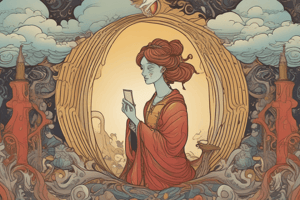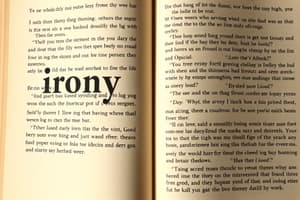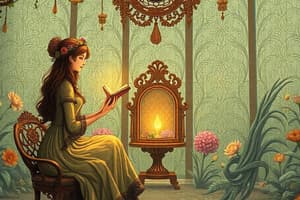Podcast
Questions and Answers
What is the main purpose of irony in literature?
What is the main purpose of irony in literature?
- To make the story predictable
- To provide a straightforward narrative
- To confuse the readers
- To create humor or serve as social critique (correct)
Which type of irony involves someone pretending ignorance to encourage dialogue?
Which type of irony involves someone pretending ignorance to encourage dialogue?
- Understatement
- Sarcasm
- Hyperbole
- Socratic irony (correct)
In what way does situational irony differ from dramatic irony?
In what way does situational irony differ from dramatic irony?
- Situational irony involves characters' actions, while dramatic irony involves the audience's knowledge. (correct)
- Situational irony is used in tragedies, while dramatic irony is used in comedies.
- Situational irony is used for humor, while dramatic irony creates tension.
- Situational irony reveals the opposite of what is expected, while dramatic irony reveals characters' thoughts.
Which form of irony is characterized by emphasizing the effects of a literal meaning by minimizing its importance?
Which form of irony is characterized by emphasizing the effects of a literal meaning by minimizing its importance?
What does dramatic irony aim to achieve in a play?
What does dramatic irony aim to achieve in a play?
Which type of irony is often used in Greek drama to emphasize a character's prideful actions?
Which type of irony is often used in Greek drama to emphasize a character's prideful actions?
What distinguishes sarcasm as a type of verbal irony?
What distinguishes sarcasm as a type of verbal irony?
'He's as fast as a tortoise' is an example of which type of verbal irony?
'He's as fast as a tortoise' is an example of which type of verbal irony?
Which form of irony focuses on the contradiction between what should be true and what actually occurs?
Which form of irony focuses on the contradiction between what should be true and what actually occurs?
What is the key difference between verbal irony and dramatic irony?
What is the key difference between verbal irony and dramatic irony?
What type of irony occurs when a character misinterprets the story's situation and events?
What type of irony occurs when a character misinterprets the story's situation and events?
In 'The Story of an Hour,' what type of irony is exemplified when Mrs. Mallard believes she is free from marriage but ends up dying in horror?
In 'The Story of an Hour,' what type of irony is exemplified when Mrs. Mallard believes she is free from marriage but ends up dying in horror?
What literary device refers to the occurrence of multiple possible interpretations of a sentence, word, or piece of writing?
What literary device refers to the occurrence of multiple possible interpretations of a sentence, word, or piece of writing?
Which element of a short story encompasses the central idea or message conveyed by the story?
Which element of a short story encompasses the central idea or message conveyed by the story?
'The Gift of the Magi' by O.Henry is set during which time of the year?
'The Gift of the Magi' by O.Henry is set during which time of the year?
'The Lion King' example demonstrates what type of irony when Scar says he has a surprise for Simba?
'The Lion King' example demonstrates what type of irony when Scar says he has a surprise for Simba?
Which type of conflict in a short story involves struggles between the main character and other characters or society?
Which type of conflict in a short story involves struggles between the main character and other characters or society?
'Eye Drops Off Shelf' headline is an example of ambiguity due to what reason?
'Eye Drops Off Shelf' headline is an example of ambiguity due to what reason?
'The Gift of the Magi' story features Della selling her hair to buy a gift for Jim, showcasing what type of literary device?
'The Gift of the Magi' story features Della selling her hair to buy a gift for Jim, showcasing what type of literary device?
What literary element is limited in depth in short stories due to their constrained length?
What literary element is limited in depth in short stories due to their constrained length?
Flashcards are hidden until you start studying
Study Notes
Irony in Literature
- The main purpose of irony in literature is to convey meaning, create humor, and highlight contradictions.
Types of Irony
- Irony of ignorance: involves someone pretending ignorance to encourage dialogue.
- Situational irony: differs from dramatic irony in that it involves an unexpected twist or contradiction between what is expected and what actually occurs.
- Understatement: characterized by emphasizing the effects of a literal meaning by minimizing its importance.
- Dramatic irony: aims to achieve suspense, tension, and humor in a play by allowing the audience to know something the characters do not.
Verbal Irony
- Sarcasm: distinguished by its condescending tone and intent to cut or wound.
- Overstatement: exemplified by phrases like "He's as fast as a tortoise" to emphasize the opposite of what is literally meant.
- Verbal irony: differs from dramatic irony in that it involves a contradiction between what is said and what is meant.
Other Literary Devices
- Irony of fate: focuses on the contradiction between what should be true and what actually occurs.
- Tragic irony: occurs when a character misinterprets the story's situation and events.
- Ambiguity: refers to the occurrence of multiple possible interpretations of a sentence, word, or piece of writing.
- Theme: encompasses the central idea or message conveyed by the story.
Short Stories
- "The Story of an Hour" by Kate Chopin exemplifies situational irony when Mrs. Mallard believes she is free from marriage but ends up dying in horror.
- "The Gift of the Magi" by O. Henry is set during Christmas time and features Della selling her hair to buy a gift for Jim, showcasing the literary device of sacrifice.
- Interpersonal conflict: involves struggles between the main character and other characters or society.
Note on Literary Elements
- Symbolism: limited in depth in short stories due to their constrained length.
Studying That Suits You
Use AI to generate personalized quizzes and flashcards to suit your learning preferences.




